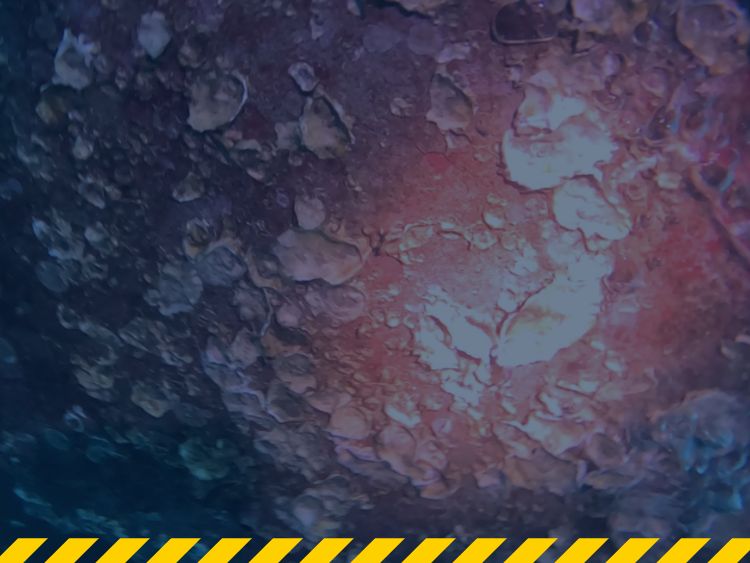Biofouling—the buildup of marine organisms like algae, barnacles, and mussels on ship hulls—poses serious challenges in the maritime industry. It directly impacts vessel performance, fuel efficiency, and environmental health.
Understanding biofouling’s effects and implementing effective control measures are essential for efficient and sustainable marine operations. At Weser Maritim, we prioritize innovative solutions for biofouling cleaning to optimize vessel performance and protect marine ecosystems.

- Evaluating Vessel’s Underwater Hull Condition: The first step in determining whether a ship’s subsea sections have biofouling is to conduct an underwater hull survey.
- Supply of Necessary Equipment for Cleaning: After analyzing the condition of the underwater hull, the next step is to determine the necessary tools and chemicals (if needed) and supply them.
- Underwater Hull Cleaning: The final step is to conclude the underwater hull cleaning operation at a safe place for both the vessel and the ship by sustainable practices to protect the environment.
Marine biofouling is caused by the adhesion of barnacles, macroalgae and microbial slimes. It is a worldwide problem in marine systems, costing the US Navy alone an estimated $1 billion per annum. On ships’ hulls, biofouling results in an increase in roughness, which in turn leads to an increase in hydrodynamic drag as the vessel moves through water. Increased fuel consumption, hull cleaning, paint removal and repainting, and associated environmental compliance measures all contribute to the costs of biofouling (Callow, M. E., & Callow, J. A. (2002). Marine biofouling: A sticky problem. Biologist, 49(1), 1).
The Consequences of Marine Biofouling
- Increased Fuel Consumption: Biofouling creates a rough hull surface that increases drag and resistance, leading to higher fuel usage. Even minor biofouling can raise fuel costs by up to 20%, significantly impacting operating expenses and carbon emissions.
- Maintenance Challenges: Allowing biofouling to accumulate makes cleaning and maintenance more complex and costly. Extensive buildup requires more intensive cleaning efforts, leading to increased maintenance downtime and impacting operational efficiency.
- Environmental Risks: Biofouling can carry invasive species to new environments, disrupting local ecosystems and threatening biodiversity. When vessels move between regions, they can transport non-native organisms, potentially harming marine life in different waters.
The study, titled “Investigation of Fuel Consumption on an Operating Ship Due to Biofouling Growth and Quality of Antifouling Coating” (IOP Conference Series: Earth and Environmental Science), examines fuel consumption on a vessel from November 2015 to September 2017 to assess the effects of biofouling and coating quality on fuel efficiency. During drydocking from August to October 2016, the ship’s fouled hull was cleaned and repainted with a high-quality anti-fouling coating. In the initial period, with standard anti-fouling paint, fuel usage increased by 20% (slope factor of 0.275% per trip). Following the application of higher-quality paint, the increase dropped to 5%, with a slope of 0.0758% per trip, highlighting the effectiveness of improved coatings in slowing biofouling and reducing fuel use. Post-drydocking, fuel consumption decreased but did not fully return to pre-fouling levels due to added roughness from hull cleaning. This study underscores how biofouling elevates fuel costs and that while drydocking and high-quality coatings reduce consumption.
Weser Maritim’s Approach to Biofouling Control
Weser Maritim offers a range of services designed to manage and prevent biofouling effectively:
- Anti-Fouling Coatings: We apply specialized coatings that prevent the attachment of marine organisms. Our coatings reduce drag, which enhances fuel efficiency, and also minimize the frequency of maintenance, cutting costs for vessel operators.
- High-Pressure Hull Cleaning: For vessels already affected by biofouling, we use high-pressure water jetting. This method is both efficient and environmentally friendly, as it removes biofouling organisms without introducing harmful chemicals.
- Routine Maintenance and Inspection: Preventative maintenance is essential for managing biofouling. We work with clients to schedule regular inspections, allowing us to address potential biofouling issues early and prevent long-term damage.
- Eco-Friendly Disposal: Weser Maritim manages biofouling waste responsibly. We ensure that all removed organisms are disposed of safely, aligning with global conservation standards and preventing invasive species from spreading.
Effective biofouling management goes beyond maintenance; it’s a vital aspect of sustainable marine operations. Through advanced anti-fouling coatings, regular hull cleaning, and responsible disposal practices, Weser Maritim helps vessels maintain peak performance while safeguarding marine ecosystems. As the industry moves toward greener practices, managing biofouling will remain a top priority, helping reduce environmental impact, extend vessel lifespan, and support sustainable marine operations.

